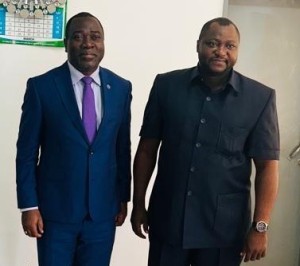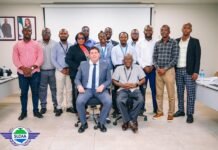The Ministry of Trade and Industry was recently briefed on plans by the United Nations Country Team (UNCT) to facilitate a joint UN engagement and informed advocacy to support the country to leverage better the opportunities presented by the African Continental Free Trade Area (AfCFTA) as part of the country’s drive for economic recovery and sustainable development.
United Nations Resident Coordinator (RC), Babatunde Ahonsi, disclosed such moves to the Minister of Trade and Industry, Dr Edward Hinga Sandy, in an engagement at the Minister’s Youyi Building Office in Freetown, accompanied by UN Women’s Head of Office, Ms. Setcheme Mongbo and UNCDF’s Country Manager, Wycliffe Ngwabe.
The Resident Coordinator stated that the UNCT is aware of the economic challenges developing countries, including Sierra Leone, are facing because of global shocks’ impacts, “including the prolonged effects of the COVID-19 pandemic, climate change, and most recently the war in Ukraine.”
He further said that despite those economic challenges, the UN believes that the country can benefit from several opportunities presented by the AfCFTA agreement.
“As the implementation of AfCFTA started on the 1st January 2021, it is important that Sierra Leone seriously and speedily seeks to explore intra-regional trade opportunities and maximize economic growth advantages offered by AfCFTA, the world’s largest free trade agreement by the number of participating countries,” he emphasized.
He stressed that a collective and more systematic engagement by the UN System in Sierra Leone would better enable the country to significantly and beneficially grow its exports and imports from other African countries through the enhanced opportunities and arrangements offered by AfCFTA.
The UNCT, the UN Coordinator disclosed, has already identified a number of critical steps that will push forward that initiative based on the leadership of the Ministry of Trade and Industry.
In his response, the Minister thanked the RC and the UNCT for opting to support the Ministry in its efforts to operationalize AfCFTA in Sierra Leone and noted that they are ready to work with the UN to strengthen the institutional framework and strategy for fully implementing the AfCFTA agreement.
He also informed the RC that the structures are already in place in his Ministry but would need to be strengthened through technical collaboration with the UN.
Dr Sandy called for the involvement of other players, including the private sector and the media, to intensify public dialogue on the national AfCFTA Strategy and acknowledge the need to prepare the private sector to produce and ensure they have access to raw materials and to be able to compete internationally.
The Minister agreed with the UN RC on the need for enhanced intra-African trade and support to strengthen local businesses. He believes this will trigger job creation for Sierra Leone’s youthful population further noting that for every revenue Government loses in the form of concession to the private sector, there should be a corresponding benefit of job creation in the country.
Dr Sandy ended by acknowledging that all the issues the UN Resident Coordinator raised are very important and that his Ministry is ready to work with the UN to ensure Sierra Leone benefits from the AfCFTA agreement.
The meeting with the Minister was informed by prior consultations among several UN agencies on how best to support the country to operationalize AfCFTA.
Recently, the RC had a virtual meeting with the Chief of Staff of the Accra-based AfCFTA Secretariat. At that meeting, he obtained clarity on what the UN could do to best support Sierra Leone to intensify its operationalization of AfCFTA at the country level.
It also brought to the fore the sort of support that is available at the Secretariat for member States to fully implement AfCFTA, and the steps being taken to ensure that the informal sector, women, and youth issues are adequately factored into AfCFTA processes.
Key takeaways from that meeting which would require collaboration between the UN and the Ministry of Trade and Industry, include broad-based validation and popularization of the national AfCFTA Implementation Strategy to secure the buy-in and engagement of all relevant MDAs, private sector, development partners, and other relevant stakeholders.
Also, the need for a National AfCFTA Coordination Office as a high-level inter-ministerial and multi-stakeholder oversight and management mechanism for AfCFTA implementation, and the urgent need for the country to participate in the upcoming Intra-African Trade Fair in Abidjan in November with the strong involvement of the private sector.
Additionally, there is need for official outreach to the Secretariat to identify the products that businesses in Sierra Leone may wish to export and import as part of intra-Africa trade with preferential tariff arrangements with other countries under the Guided Trade Initiative of AfCFTA.





